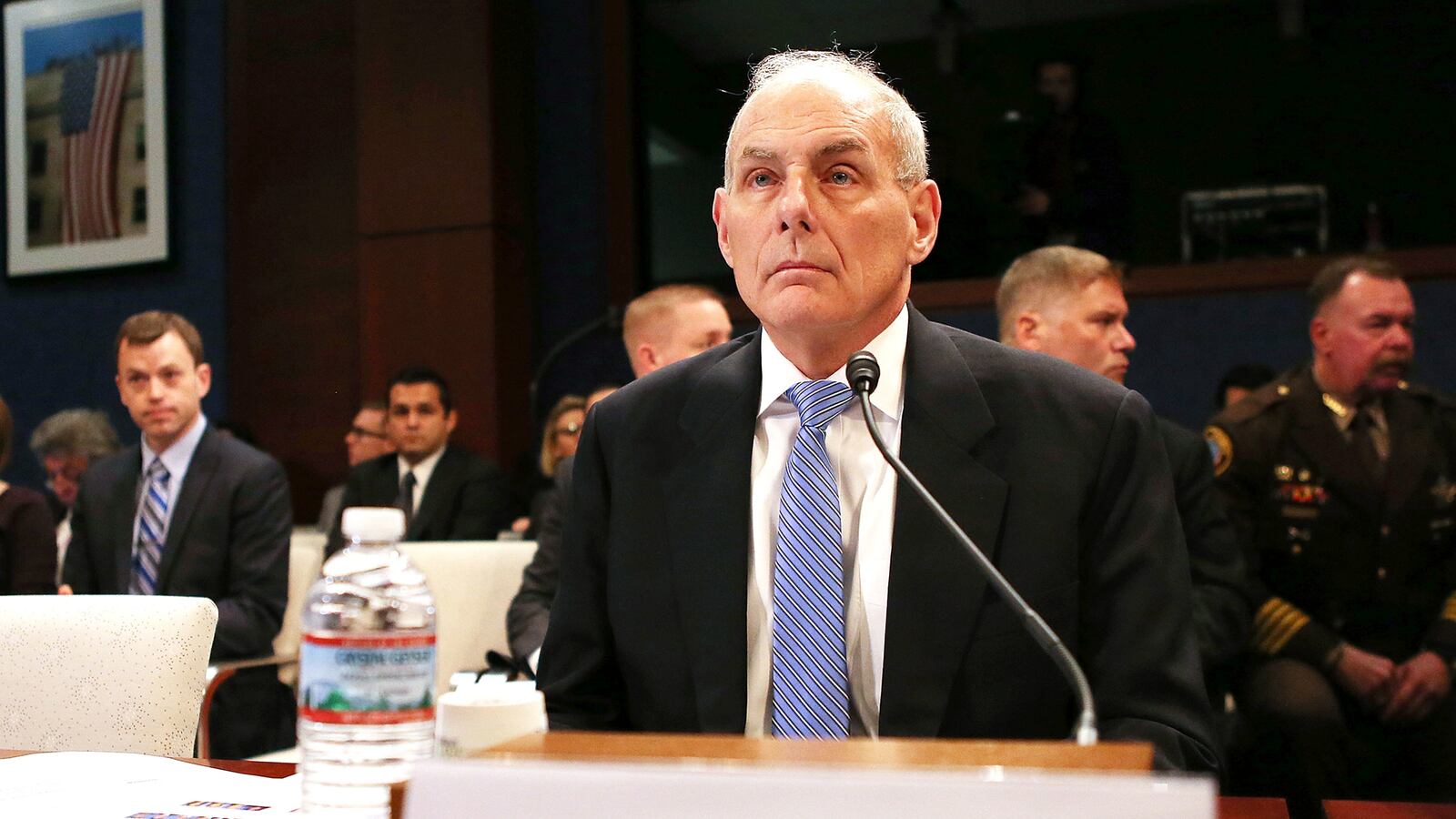Secretary of Homeland Security John Kelly told Congress on Tuesday that “extreme vetting” of immigrants may not be temporary and may get more extreme.
Kelly said new vetting standards under consideration include asking people to hand over their social media passwords—and deny them entry if they refuse.
“How’re you living, who’s sending you money, what websites you visit—anything we can do to get a handle on who these people are,” Kelly told the House Homeland Security Committee.
Kelly also spoke about a recent meeting with the CEO of IBM, saying he plans for DHS to use analysis of big data and social media at the border, in vetting of refugee and visa applicants, and in other national security missions.
As for the seven majority Muslim countries temporarily banned under President Trump’s executive order, Kelly said the ban may continue beyond the initial 80-day review process. He suggested that some of the countries may be able to meet increased vetting standards, but those that may not—most likely those in failed states with no U.S. embassy like Yemen—may find the current ban re-upped for the indefinite future.
The secretary repeatedly denied the order is a “Muslim ban,” saying the countries chosen are those where the U.S. does not trust the capabilities of local police and government to identify and provide records on its citizens.
Kelly also responded to questions about Trump’s criticism of the “so-called judge” who suspended the order. The retired Marine general said judges aren’t responsible for protecting the nation from attacks.
“Judges, in their world they have very academic discussions, but in their courtroom they are protected by people like me,” Kelly said.
And like a good soldier, Kelly repeatedly fell on his sword to take the blame for the hasty, chaotic rollout of the executive order.
“Lesson learned, that’s on me. I should’ve slowed it down by a day,” he said. “I knew full well it was going to be released on Friday. I should’ve taken time to notify Congress.”
Aside from the executive order, Kelly said he will open a new office under Immigration and Customs Enforcement “raised up to the secretary level” that will provide family members of victims of crimes committed by undocumented immigrants with updates on their case.
The secretary also said he would increase the number of immigration courts, which he said would act as a deterrent by showing people they will be waiting around for three or four years before being deported. Immigration courts are notoriously backlogged and unable to handle the demands at the border.
Kelly also expressed an interest in closely working with Mexico in the war on drugs, which may prove difficult in light of Trump’s hostile communications with President Enrique Peña Nieto.
“I think a huge partner here is Mexico,” he said. “If we can help them get after the poppy production, as an example, if we can help them get after the production labs, if we can help them get after the heroin, methamphetamine, as it’s moving in relatively large amounts before it gets to the border,” stressing the U.S. has already lost once drugs cross the border.
The only way is to go after demand, Kelly said.
“We don’t have a drug reduction program in the United States. It’s embarrassing—we’re not even trying,” he railed.
Kelly said he’d like to increase the use of surveillance balloons called aerostats along the border.
Rep. Filemon Vela (D-TX) asked Kelly about the focus on Mexico.
“The threat of terrorists exists at airports, seaports at the southern and northern border. What I’m wondering [is], if we’re obsessing over the southern border, are we missing the boat?” he asked.
“The largest opening and uncontrolled part of the border is the southwest border. We do a real good job at the airports. The northern border—the good news is Canada is an unbelievable partner,” Kelly responded. “Not much that flows in from Canada.”
That assertion contradicts FBI reports obtained by The Daily Beast detailing the number of known or suspected terrorists encountered at land border crossings. The reports show higher numbers at the Canadian than Mexican border.
Kelly and Texas local law enforcement who testified later in the day on Tuesday stressed the need to update technological resources on the border that could be utilized most effectively to combat border security threats including drug, human, and sex trafficking operations.
Tuesday’s final witness, Judge Eddie Trevino of Cameron County, Texas, said he was testifying to implore Congress to pursue other security measures than the proposed border wall.
“Contrary to what has been proposed, the border wall concept is ineffective and creates a false sense of security that will do nothing to alleviate the problem with the criminal element, drug cartels, gangs and other organizations looking to harm the country and our people,” he said in written testimony submitted before the hearing.
Instead, Trevino said the border could be secured with a virtual wall of cameras and sensors.






